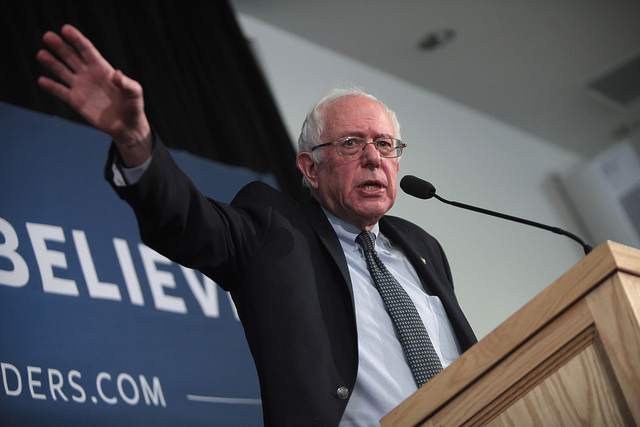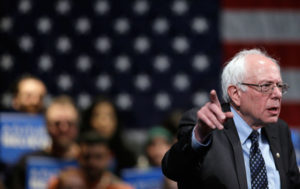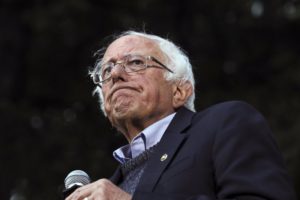Bernie Sanders: Billionaires Are Destroying the Fabric of Our Country
In a revealing new interview, the Vermont senator says we are ignoring runaway income inequality at our grave peril. Sen. Bernie Sanders, I-Vt. (Gage Skidmore / Flickr)
Sen. Bernie Sanders, I-Vt. (Gage Skidmore / Flickr)
What follows is a conversation between Sen. Bernie Sanders, I-Vt., and Paul Jay of the Real News Network. Read a transcript of their interview below or watch the video at the bottom of the post.
PAUL JAY: Welcome back to The Real News Network. I’m Paul Jay. We’re in Burlington, Vermont at the Sanders Institute Gathering. And once again, we’re joined by Senator Bernie Sanders. Thanks for joining us.
BERNIE SANDERS: My pleasure.
PAUL JAY: In one of the panels yesterday you said it’s not just about concentration of wealth and how the inequality, how unfair that is, the suffering it causes. But concentration of wealth means concentration of power. How do you challenge that power?
BERNIE SANDERS: This is not easy stuff. But we are certainly not going to deal with it if we don’t discuss it. And one of the crises that we face right now is that you’ve got a media that will not talk about this issue. And you’ve got, essentially, two parties that don’t talk about it very much. And I think one of the things that I wanted to do in my presidential campaign is kind of bust this whole thing open. Let’s talk about the real issues. You know, whether CBS likes it or not.
So what you have here is, first of all, massive income and wealth inequality. And as a nation we have got to think from a moral perspective and an economic perspective whether we think it is appropriate that three people, one, two, three, own more wealth than the bottom half of the American society. You know, that’s really quite outrageous, and it’s appropriate that we take a hard look at that. But it is not just that the one tenth of 1 percent owns more wealth than the bottom 90 percent. They don’t put their wealth underneath their mattresses, right. They use that wealth to perpetrate, perpetuate their power. And they do that politically. So you have the Koch brothers and a handful of billionaires who pour hundreds of millions of dollars into elections, because their Supreme Court gutted the campaign finance laws that were in existence, and now allow billionaires quite openly to buy elections.
So wealth equals power, politically. Wealth means that if I own a company in the United States, I own a GE plant, where there may be hundreds or thousands of workers, and that plant may be making money, but not as much money as it could make if I took it to China or to Mexico, I have the power to do that. Because politicians are not going to stop me. Because we have disastrous trade laws. If I am a billionaire, it is likely that I will have control over media, as well. So you have a handful of media conglomerates owned by some of the wealthiest people in this country and in the world determining what the news is; what is appropriate for the American people to discuss and not to discuss.
Now what–my wife Jane, she put this thing together, I’m a guest here. But what she understood is that when we deal with climate change, when we deal with the economy, when we deal with housing, when we deal with criminal justice or immigration issues, we have got to deal with those in a holistic way, and understand why all of that is happening. Not see them as separate issues. And a lot of that has to do that we live in a nation owned and controlled by a small number of multi-billionaires whose greed, incredible greed, insatiable greed, is having an unbelievably negative impact on the fabric of our entire country.
PAUL JAY: The process of financialization that’s taken place over the whole 20th century, especially since World War II, where finance, Wall Street is so dominant in the economy. And this concentration of ownership and concentration of power is, nowhere is that more important than in the financial sector, because it permeates everything.
BERNIE SANDERS: Yes.
PAUL JAY: But every attempt to regulate finance has been without much success at best, and currently whatever there was is being dismantled. Doesn’t there needs to also be a building up of the public sector, starting with banking? Some kind of public banking? Because you can’t really reform these guys, because they all-
BERNIE SANDERS: I don’t know that you can’t reform them. And I think your point is, though, very well taken. What we need–look, let’s be clear. You have … I will never forget, Lloyd Blankfein, the head of Goldman Sachs, came to Congress a few years ago. And this is after the taxpayers of this country bailed them out because of their greed and their illegal behavior. This is chutzpah. These guys, after being bailed out by the middle class and working families of this country, after causing incalculable harm, which–the Wall Street crash cost us millions of jobs, people lost their homes, they lost their life savings. These guys, after getting bailed out, they come to Congress. They say, you know, what we think Congress should do is you gotta cut Social Security, and Medicare, and Medicaid. And by the way, lower corporate tax rates and give more tax breaks to the wealthy. That’s power. That’s chutzpah. We have it all, we can do whatever we want to do. And I think the power of Wall Street.–you’ve got a half a dozen banks that own over 50 percent, equivalent to 50 percent of the assets in our GDP. And we have got to stand up to them.
Now, your point is, OK, while we try to do that, are there other alternative models? And right here in the state of Vermont I am a strong advocate of a state bank, for example, where we can use the tax revenue that comes in for the public good, to help us create jobs, deal with agriculture, deal with the environment and climate change, and so forth.
PAUL JAY: Because the blackmail that happened in ’07-’08, too big to fail, and too big to go to jail. And-
BERNIE SANDERS: That’s right. And we have–but I don’t want to give up that fight. We have legislation in that is so–commonsense legislation, that when you have a handful of banks that have such incredible control over our economy that when they agreed destroys the economy they have to be bailed out because they’re too big to fail. But it also gives them unbelievable political power. You gotta break them up. And we have legislation in there that would break up the largest banks and financial institutions in this country. And that’s what we should do.
PAUL JAY: But aren’t you concerned that, like when the telecoms were broken up, they reassemble. The capital behind the big banks are still there. And I’m not suggesting breaking up the big banks isn’t a good thing. But don’t you need a public bank at a scale that next time there’s, there’s this blackmail, you can say, you know, go speculate. If you go down, you go down.
BERNIE SANDERS: I’m not arguing with you, I agree with you. And I think right here in Vermont right now there are a number of people in our legislature, and I support this effort, that want to see a public bank. Ironically enough, you know what the oldest state public bank in the country is?
PAUL JAY: North Dakota.
BERNIE SANDERS: North Dakota. They’ve had it, I think, since the ’20s. And it’s worked pretty well for them. You know, we’re trying to strengthen credit unions, as well. And since the Wall Street crash, by the way, I think credit unions have seen a lot more capital coming in and a lot more growth.
PAUL JAY: Just finally–I know you have to run. The primary in 2016 got quite bitter. We know that whoever, whoever released these emails, and all the rest–we know the DNC was manipulating things in favor of Hillary Clinton and against you. This fight heading into 2020, whether you’re the candidate or there is a candidate that’s on the Sanders-esque kind of platform … This fight in the Democratic Party is not, in my opinion, just a difference of opinion how to get to the same place, which is sometimes framed that way. There’s a real struggle of interest here. The fight against the oligarchy–well, there’s an oligarchy in the Democratic Party. And there’s a fight there. How do you see this campaign unfolding?
BERNIE SANDERS: I’m proud that out of our campaign, I think, we have seen a significant increase–not just out of our campaign–but a great deal of grassroots activism all across this country. This new incoming freshman class in the Congress is not only going to be the most progressive freshman class in a very long time, but the most diverse. More women, more people of color, et cetera. Also, I think what is happening in this country is that to a significant degree we are winning the ideological struggle. Three years ago, as you recall, Medicare for All was seen to be a radical, fringe idea. Last polls that I saw, 70 percent of the American people support Medicare for All. And more and more Democrats are coming on board. Raising the minimum wage, 15 bucks an hour. Radical idea a few years ago; kind of mainstream today. Rebuilding our crumbling infrastructure, making public colleges and universities tuition-free, dealing with student debt, dealing in an aggressive way with the unbelievably dangerous challenge of climate change. I think more and more people understand that. Criminal justice reform. Immigration reform.
So many of the ideas that we campaigned on have now gotten broad support throughout the country and within the Democratic Party. But as, I think, your point makes, look. There is an establishment within the Democratic Party. There are Wall Street contributors in the Democratic Party, corporate contributors in the Democratic Party. And they have a very different and more conservative vision for the future of the Democratic Party than I do. My vision is pretty simple. My vision is that we have got to have the guts to take on Wall Street, take on the pharmaceutical industry, take on the insurance industry, take on the 1 percent, create an economy that works for all. And while we do that, we bring our people, and that is black, and white, and Latino, and Native American, and Asian American together. I think that’s the way you do it. And we’re beginning, beginning, beginning to see that. We’re seeing great young candidates who didn’t wait on line for 20 years to get permission to run, but kind of jumped in and beat some long-term incumbents. They’re saying, hey, I come from the community. I know what’s going on in this community, and I’m going to fight for working people, and I’m not afraid to take on big money. We’re seeing that. We got to see more of that.
So a two-part approach. Number one, we need to fight for our agenda. We need to elect candidates from the grassroots who are going to, are going to implement that agenda.
PAUL JAY: All right, thanks very much for joining us.
BERNIE SANDERS: Thank you very much.
PAUL JAY: And thank you for joining us on The Real News Network.
Your support matters…
Independent journalism is under threat and overshadowed by heavily funded mainstream media.
You can help level the playing field. Become a member.
Your tax-deductible contribution keeps us digging beneath the headlines to give you thought-provoking, investigative reporting and analysis that unearths what's really happening- without compromise.
Give today to support our courageous, independent journalists.






You need to be a supporter to comment.
There are currently no responses to this article.
Be the first to respond.